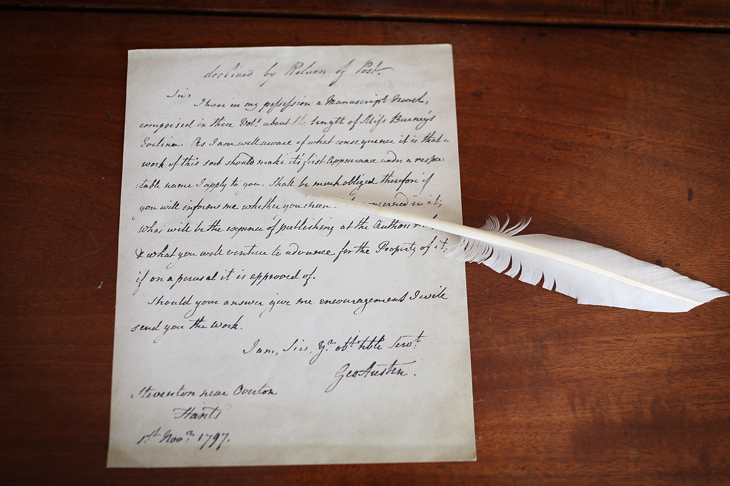At Christmas dinner my wife’s family has a longstanding practice of going around the table asking each person to tell the rest the one or two things from that year for which he or she is most thankful. I’m sure that more than a few readers have a similar custom. I mention that because Australia’s bravest editor (just look at the virtually unique courage he showed in making this publication one of the world’s best in standing up to lockdown thuggery and mandate illiberalism), The Spectator Australia’s very own Rowan Dean, has suggested to all of us regular writers that perhaps for the Christmas issue we might want to be a bit more reflective and quirky than is our usual wont.
So a few days ago, there I was reflecting on what to be reflective about. (It’s harder quirking while pondering what to be quirky about.) And for no particular reason I got to thinking about the unusual things for which I was very grateful and disposed to feel lucky. Not the important things such as the continuing health and well-being of our kids and spouses. Or how we’d all won the lottery of life living in Australia (where English is the main language and the country’s criminal law system is founded on the presumption of innocence – oops, sorry ACT and Victorian readers).
In other words, I got to thinking of unusual things not simply over the past year but over the course of my life for which I was grateful. Little, quirky things not the big life events. What were a couple of those that stood out?
Well, here’s one. It goes back to the teachers I had in my Toronto state schools who made us all memorise some poetry. You see my maternal grandmother had myriad lines of poetry that she could recite right into her nineties. Whole poems. Shakespeare sonnets and soliloquies. The Romantic poets. You name it; there was a good chance she could recite it. I’m not remotely in my late grandmother’s league. But ever since primary school and then high school, where teachers actually forced kids to memorise famous poems and Shakespearean passages, I’ve been incredibly fortunate. You see way back then I learnt by heart quite a few things. I can do three full Shakespeare sonnets (29th, 129th and 18th). And eight or nine of his most famous soliloquies. I can recite Kipling’s ‘If’, which we made both our kids memorise and which they can still do and which you can think of as Jordan Peterson condensed down into one beautiful, powerful poem. Likewise, I’ve memorised William Henley’s ‘Invictus’, which was reputed to be Nelson Mandela’s favourite poem (for obvious reasons perhaps) and again which our kids can recite. And a couple of war poems – ‘In Flanders Fields’ by the Canadian John McCrae and ‘The Charge of the Light Brigade’ by Alfred Lord Tennyson. Full disclosure: I love both those poems, and note for Aussie readers that all Canadian Remembrance Day services will include McCrae’s haunting poem made more haunting by the fact he died just before the end of the first world war commanding a battlefield hospital. I’ve got the starting bits of Melville’s Moby Dick and Jane Austen’s Pride and Prejudice off by heart, both being terrific and with Austen showing that ironic cynicism that makes her my favourite female writer save for perhaps Agatha Christie. There’s Edward Lear’s ‘The Owl and the Pussycat’ and chunks from David Hume’s Essays. Oh, and I memorised a few biblical passages, including 1st Corinthians 13 and the 23rd Psalm. And let me be clear that when I read the Bible back in my first year as a practising lawyer I read the King James’ Version (the one documenting the way God would actually talk and the only thing I’ve ever read that rivals Shakespeare for the sheer beauty of its prose) so that is the version I can recite. God’s version. I can also reveal to readers a small secret. It took me almost a whole year to the read the Bible because I would only read it on the 25-minute subway commute to and from work each day to my big downtown Toronto law firm. But I discovered this was also a fantastic way to get a seat on incredibly crowded commuter trains. Get on the train. Open the Bible. Presto, everyone around me had moved away and I had a seat.
Now you might think that it’s something of a drag to sit down and memorise poems and passages, and you’d be right. But boy, am I grateful today. Years later I realise that I am carrying around in my head some of the highlights of Western civilisation. And forget what the postmodernist nihilists say, Western civilisation has delivered the world’s best way of life today measured by what most human beings want.
It has delivered antibiotics, jet airplanes, the best life females have ever had anywhere at any time in human history, a Royal Navy that ended slavery on the high seas at great cost to British taxpayers when every other culture still practised slavery. (How many of our ill-educated Australian students know that far more African slaves were bought for and sent to the Islamic world than to the West? I’m betting not many.)
It alone went through an Enlightenment that changed all cultures everywhere, though my view is that the Scottish version was much superior to the French. At any rate, I am today immensely grateful to have this modicum of poems and passages at my fingertips. Or rather in my head. Connecting me to a great past, no doubt flawed, but worthy of deep respect. It is a shame, verging on a crime, how our schools and universities have been captured by the self-loathing postmodernists.
And here’s a second quirky thing for which I’m very grateful. My wife and I have been lucky enough to drive from Toronto to San Diego, and then half-a-year later drive back. We did it twice, actually, once in 2013 and once in 2019. No stops planned in advance. On and off the interstate highways as we pleased. Diversions at a whim. (We had a week to do this drive that is 4,200 kilometres if you go the fastest route, but we serpentined.) Meeting the friendliest people on earth. A sane speed limit on the interstate highways of 75 mph, but no speeding tickets till you’re over 85 mph. (That’s just under 140 kph.) Go look at car accident deaths in Australia versus the US and Britain and Germany. You’ll soon conclude that our officious speed limits are very much only about raising money.
Anyway, that experience of driving across the US is another quirky thing for which I’m grateful. Happy Christmas to all you readers.
Thank you for making this Australia’s best publication.
Got something to add? Join the discussion and comment below.
Get 10 issues for just $10
Subscribe to The Spectator Australia today for the next 10 magazine issues, plus full online access, for just $10.
You might disagree with half of it, but you’ll enjoy reading all of it. Try your first month for free, then just $2 a week for the remainder of your first year.














Comments
Don't miss out
Join the conversation with other Spectator Australia readers. Subscribe to leave a comment.
SUBSCRIBEAlready a subscriber? Log in